Self-Esteem Meaning & Examples + Your Identity In Christ
Struggling with self-esteem? This post unpacks self-esteem meaning and examples to help you break free from insecurity and embrace your God-given confidence. Reclaim your worth in Christ and thrive boldly in life and business!
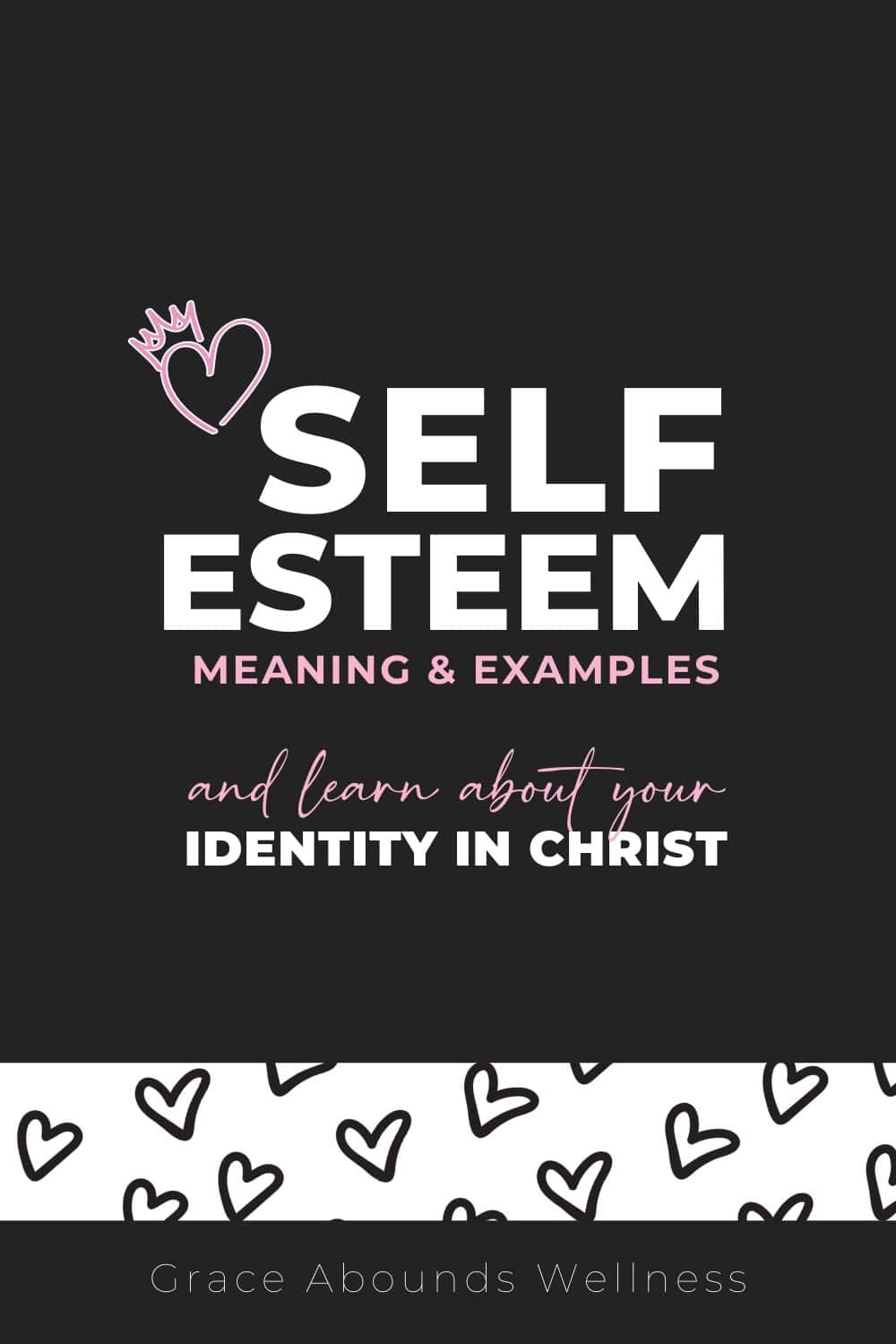
As a woman, you want to feel confident, capable, and valued — right?!
But let’s be real for a second…
We all have those moments when doubt creeps in. You feel like you’re not enough or that others don’t appreciate you.
Maybe you’re even questioning your own worth.
And honestly? That’s ok.
You’re not alone in feeling this way — in fact, SO many women (myself included!) struggle with these same thoughts.
The truth is…
When these feelings show up, they often hold us back from fully embracing our identity in Christ. They keep us second-guessing ourselves and stop us from showing up boldly in life and business.
But it doesn’t have to stay that way…
If low self-esteem is something you’re struggling with (or you just want to figure out what’s been holding you back), you’re in the right place.
In this post, you’ll learn what self-esteem really means, what the Bible says about self-esteem, and how to recognize and manage low self-esteem through your identity in Christ — as a daughter of God. Ready to dive in and break free from what’s been holding you back? Let’s dive in!
What is Self-Esteem?
So, what exactly is self-esteem?
Here’s what psychologists say…
The American Psychological Association defines self-esteem as “the degree to which the qualities and characteristics contained in one’s self-concept are perceived to be positive.”
The concept of self-esteem is how you see yourself — your physical self-image, your accomplishments, and even the way others respond to you. The more positive your view of these things, the higher your self-esteem.
What is self-esteem in simple words?
Self-esteem is how much you respect yourself based on how well you do something.
But here’s the thing…
As a daughter of God, your self-esteem isn’t about what you do. Your identity in Christ is what ultimately defines your worth — not your accomplishments.
DO THIS: Pause for a moment and write a brief description of yourself — how you see yourself right now. We’ll revisit this later to see how it aligns with your identity in Christ.
Self-Worth vs Self-Esteem + Your Identity In Christ
Before we dig deeper,…
Let’s take a moment to clarify the difference between self-worth and self-esteem. Because these terms are often thrown around as if they’re the same thing, but they’re not.
Self-worth is rooted in your identity as God’s daughter. It’s not based on what you do, but Whose you are.
You were bought at the highest price.
You are not your own, for you were bought with a price.
1 Corinthians 6:20
Your value comes from being lovingly created by God Himself.
You made all the delicate, inner parts of my body and knit me together in my mother’s womb.
Psalm 139:13
Self-esteem is more about how you view yourself based on what you achieve.
It’s tied to how well you think you’re doing in life or business.
It’s easy to link your sense of worth to how well you perform. But remember — the admiration and respect you give yourself should point back to the One who gives you the ability to do anything at all.
I can do all things through Christ who strengthens me.
Philippians 4:13
And no matter what, God is always working for your good…
…in all things God works for the good of those who love Him.
Romans 8:28
If you get anything at all out of this article — let it be this grace-filled truth you rest in…
You are more daughter than anything else. (Let that sink in!)
You are His masterpiece — a daughter of the Most High King! Nothing you do or don’t do will change that!
Okay, we’ve clarified that your self-worth is rooted in your identity as a daughter of God — not in what you accomplish.
Now…
Let’s get practical and explore what healthy self-esteem looks like when it’s grounded in that truth — through the lens of the gospel.

9 Self-Esteem Examples + Biblical Affirmations
If you’re anything like me, examples help connect the dots and make things clear, right?
So, to paint a complete picture of what healthy self-esteem looks like — here are nine real-life examples paired with self-esteem Bible verses (Biblical affirmations) to remind you of who you are in Christ.
You…
1. Like and value yourself — because of Whose you are.
You are precious and honored in my sight.
Isaiah 43:4
2. Make decisions confidently and validate yourself — because God works all things together for good.
…in all things God works for the good of those who love Him.
Romans 8:28
3. Acknowledge your strengths — all gifts and talents come from God.
Each of you should use whatever gift you have received to serve others.
1 Peter 4:10
4. Feel able to try new or challenging things — Christ gives you strength.
I can do all things through Christ who strengthens me.
Philippians 4:13
5. Show kindness toward yourself — your kindness will reward you.
A kindhearted woman gains honor.
Proverbs 11:16
6. Move past mistakes without blaming yourself — His grace is sufficient for you.
My grace is sufficient for you, for my power is made perfect in weakness.
2 Corinthians 12:9
7. Practice self-care — you are worth far more than rubies.
She is worth far more than rubies.
Proverbs 31:10
8. Believe you matter and are good enough — you are part of a royal priesthood.
But you are a chosen people, a royal priesthood, a holy nation.
1 Peter 2:9
9. Believe you deserve joy and happiness — because you trust God’s promises will be fulfilled.
For I know the plans I have for you, declares the Lord, plans to prosper you and not to harm you, plans to give you hope and a future.
Jeremiah 29:11
When you evaluate yourself — whether personally, professionally, or how you see yourself as a Christian entrepreneur — you might ask questions like…
- Am I good at what I do (in my personal life, professional life, and within the body of Christ)?
- Do the people around me respect and appreciate me?
- Am I worthy of love, success, or even that guy’s attention?
You see…
We constantly evaluate ourselves through our thoughts and feelings.
But here’s the thing…
Instead of relying on your own judgment — lean on these Biblical truths to manage your self-esteem and identity.
Because your worth is already secure in Christ!
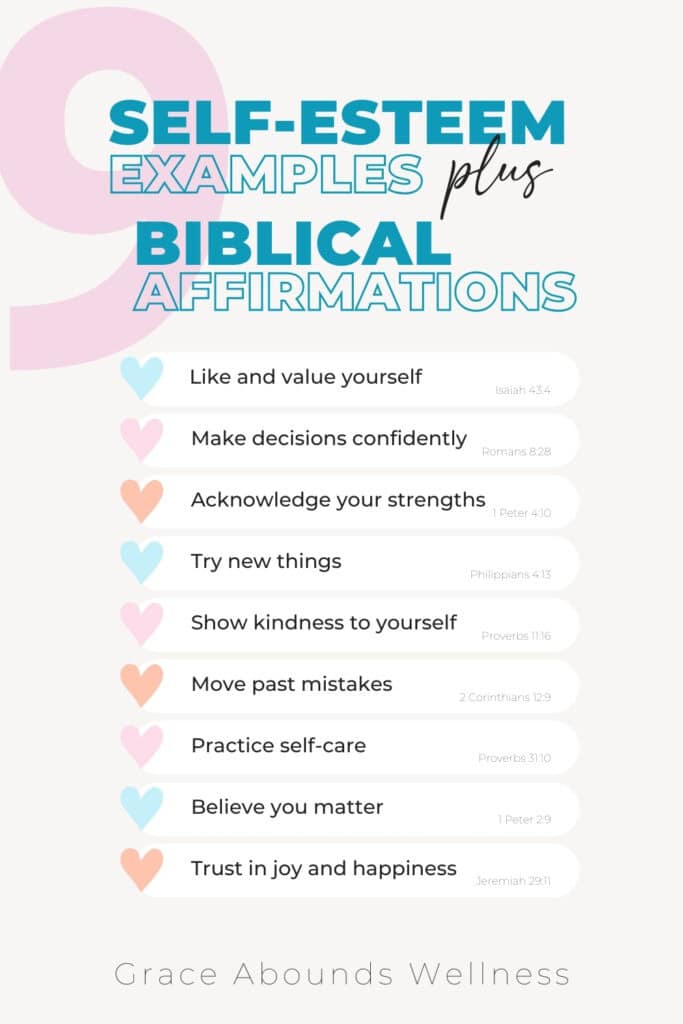
Low Self-Esteem Meaning and Examples
Low self-esteem — that little voice in your head that whispers things like…
- I’m weak.
- I’m stupid.
- I’m inadequate.
- I’m incompetent.
- I’m fat.
- I’m ugly.
- I’m a loser.
- I’m a failure — what’s the point in even trying?
- I’m not good enough because _________.
Does any of that sound familiar?
These thoughts can cripple your confidence and prevent you from seeing your true value as a daughter of God. But understanding the causes of low self-esteem can help you break free from it and start building healthy self-esteem…

How to Recognize Low Self-Esteem
The 4 Major Factors That Influence Low Self-Esteem
Low self-esteem doesn’t just appear out of nowhere — it often starts because of things that happened early in life.
Let’s look at the major factors that can influence low self-esteem…
1. Negative Early Life Experiences
Your childhood experiences with family, school, society, peers, and even church can play an important role in shaping your overall self-esteem.
And these negative thoughts and beliefs can often linger into adulthood.
Here are some specific examples…
- Punishment, neglect, or abuse
- Struggling to meet parents’, peers’, or teachers’ expectations
- Hurtful comments about your size, looks, or abilities
- Feeling like you didn’t fit in
- Not getting enough positive feedback or encouragement
2. Negative Core Beliefs
These are the negative beliefs you started to believe about yourself as a kid or teenager, because of those tough experiences. Maybe you started to think things like, “I’m not enough,” or “I’m unlovable.”
💖 Explore Related Posts 💖
- Self-Esteem vs Self-Worth: Why It’s Important…
- 5 Ways to Deepen Your Relationship with God
- How To Practice Self Love: A Christian Woman’s Guide
3. Rules and Assumptions — If/Then Statements
When you strongly believe these negative things, you start to develop certain rules for how you live — to protect yourself and make sure you keep on functioning.
For example…
If you believe you’re worthless — you might create rules like: “People will like me only if I do everything perfectly.”
4. Unhelpful Behaviors
These rules and assumptions then begin to influence your behavior and daily actions.
Make sense, right?
So…
You might try to do everything perfectly, people-please, or avoid voicing your needs.
Sound familiar?
You may find yourself working too hard to please people, avoiding risks, or always aiming for perfection because you fear failure or rejection.
But here’s the good news…
Recognizing these factors is the first step to breaking free from low self-esteem! When you know where your beliefs come from, you can replace them with God’s truth and see yourself the way He sees you 😊
High Self-Esteem Meaning and Examples
Now that you understand what self-esteem is — and what the Bible says about it — let’s talk about the other extreme: high self-esteem.
High self-esteem means having confidence in your abilities, but when it goes unchecked, it can lead to overconfidence or pride.
Sometimes, you might overestimate your abilities, becoming too confident in yourself. This can lead to pride and even narcissism.
For example…
You might feel like you’re better than others, or you don’t need God’s help, thinking you can handle everything on your own.
When you start to feel superior, it shifts your focus away from God and onto yourself. This kind of self-esteem can diminish your desire for a close relationship with God.
Remember, God opposes the proud but gives grace to the humble. If you only trust in what you can do, it’s easy to let pride tiptoe in.
God opposes the proud but gives grace to the humble.
James 4:6

But…
That doesn’t mean you should have low self-esteem.
As a Christian woman, it’s important to know that your worth isn’t based on what you do. It’s your identity in Christ that makes you good. Your value and self-esteem come from your relationship with Him — not your achievements.
Both pride and low self-esteem are extremes we need to avoid.
A healthy example of self-esteem would be walking in humble confidence — trusting in your God-given abilities while knowing that everything you achieve is through His grace.
If you only depend on what YOU can see and experience, you are likely to base your value on pride.
This doesn’t mean that you, as a Christian woman, should have low self-esteem. On the contrary, it only reinforces that what you do does not determine how good or bad you are. Grace is not performance-based. It is your identity in Christ that deems you good. You obtain your worth and esteem through an intimate relationship with Christ.
Both of these extremes need to be avoided.
A healthy example of self-esteem would be walking in humble confidence — trusting in your God-given abilities while knowing that everything you achieve is through His grace.
💖 Super Helpful Resources 💖
30-Day Digital Self-Love Journal
Check out all of the FREE Body Image Related Resources here!
The perfect workbook-style self-esteem book for Christian women
4 Major Factors That Shape Your Self-Esteem
Self-esteem isn’t something that stays the same — it’s shaped by different factors, especially for you as a Christian woman entrepreneur. These factors can influence how you approach both life and business.
1. Your Relationship with God
Your self-esteem grows when you remember that your worth comes from God, not from how well you perform. When you lean on Him, you’re reminded of your true identity as His daughter.
2. Your Business Success
How you view your success or challenges in business can either lift your self-esteem or make you feel unworthy. It’s easy to let business ups and downs affect how you see yourself, but remember, your identity is secure in Christ.
3. Your Daily Habits
Spending time with God, taking care of yourself, and having a healthy relationship with Him can help you develop a positive outlook and realistic expectations of yourself, shaping your overall self-esteem.
4. Your Support System
The people around you — whether they’re family, friends, or mentors — have a big impact on your self-esteem. They can either encourage you or bring you down, so choose your circle wisely.
By understanding what shapes your self-esteem, you can take practical steps to nurture your self-esteem in a way that’s balanced and healthy.

What is Healthy Self-Esteem?
A healthy self-esteem isn’t about being prideful or self-centered. It’s about having confidence in your God-given abilities while remaining humble. It’s about recognizing that you can do all things — but only through Christ who strengthens you.
You are more daughter than anything else.
Above every title you hold — mother, sister, wife, entrepreneur — none is greater or more permanent than being God’s daughter. That’s your ultimate identity.
When you embrace your true identity, you’re empowered to…
- Praise Him and give Him ALL the glory for who you are.
- Stand up for what you believe in.
- Take on challenges in life and in business.
- Take good care of yourself.
Healthy, Christ-centered self-esteem means walking in humble confidence — you are confident, bold, and beautiful, not out of pride, but because you know Whose you are.
But by the grace of God, I am what I am.
1 Corinthians 15:10
For a clear picture of what this looks like in real life, check out the 9 Self-Esteem Examples + Biblical Affirmations above to guide you in building healthy self-esteem rooted in your identity in Christ.
Next Steps…
How to Strengthen Your Self-Esteem and Identity in Christ
Well, my friend, you’ve learned a lot! But if there are two main takeaways, they are these…
- Your daughtership in Christ deems you good.
- Introspection with Christ is essential to your growth.
Invite the Holy Spirit to reveal what He wants to set you free from. Here’s how you can take simple steps toward that today… I know life gets busy, so let’s keep this simple. Working through all these steps will help you see results quicker, but if you only have a minute, just pick one and start there. Even small actions can make a big difference!
- Reflect on Your Self-Description
Go back to the description you wrote of yourself earlier. What words did you use? Were they mostly positive, negative, or a mix? - Take it to God in Prayer
Ask the Holy Spirit to reveal any lies you might be believing about yourself. Invite Him to replace those lies with God’s truth about your identity. - Speak Life Over Yourself
Use Biblical affirmations to remind yourself of who you are in Christ. For example, “I am chosen, valuable, and loved by God.” - Challenge Negative Thoughts
When negative self-talk creeps in, replace it with what God says about you. For example, when you think, “I’m not good enough,” remind yourself, “I can do all things through Christ who strengthens me” (Philippians 4:13). - Take Care of Yourself
Remember that you are valuable — physically, emotionally, and spiritually. Spend time in prayer, care for your body, and surround yourself with supportive people.
By working through these steps, you’ll strengthen both your self-esteem and your identity in Christ. But if you’re short on time today, just pick one step — even the smallest action can help you walk confidently in your purpose and thrive in life and business.
You’ve got this!
Now that you understand self-esteem meaning and examples, my prayer is that you’ll break free from feelings of inadequacy and step boldly into your identity in Christ — walking in humble confidence, knowing you are deeply loved!
🤗 Sharing is caring!
If this post spoke to your heart, would you share it with a solopreneur friend who might also be feeling stuck or second-guessing herself?
Text her the link. (Seriously — don’t overthink it.)
Because sharing the hope is what it’s all about.
And hey — I’d love to hear from you!
Drop a comment below and let me know if this helped or what you’d love to see me unpack next. I’m all ears, friend.



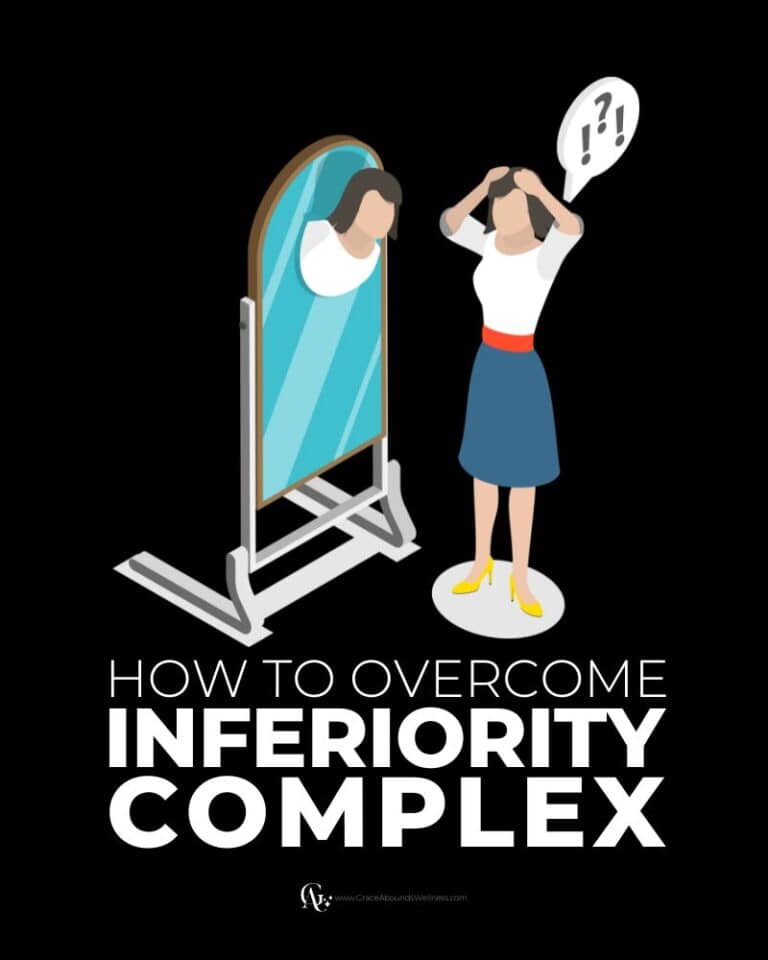
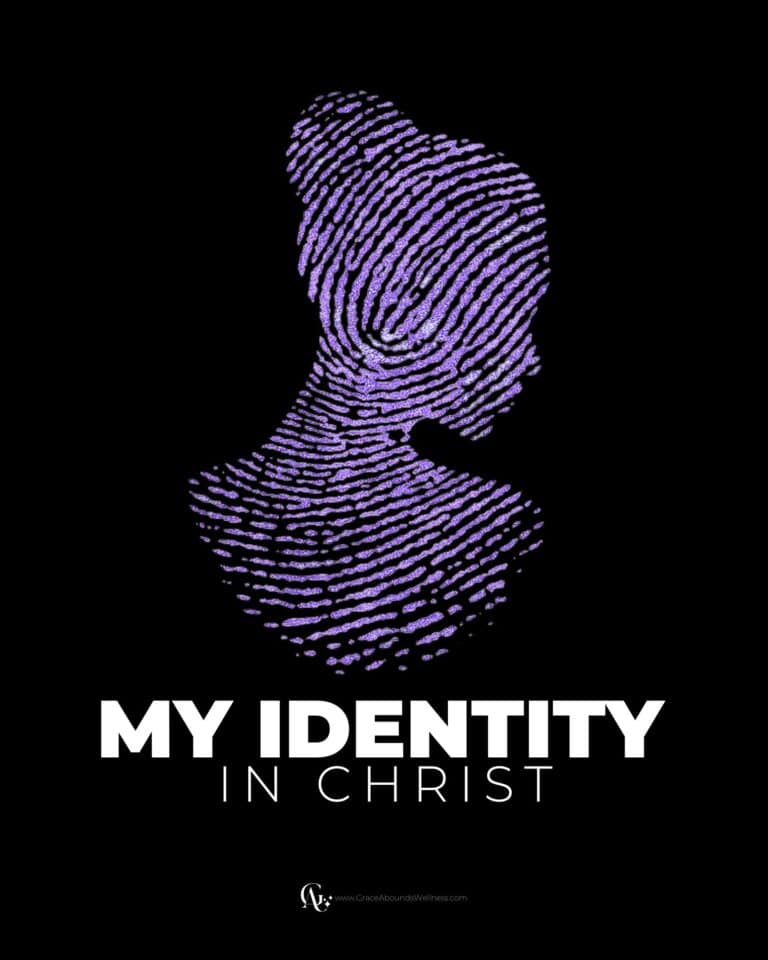
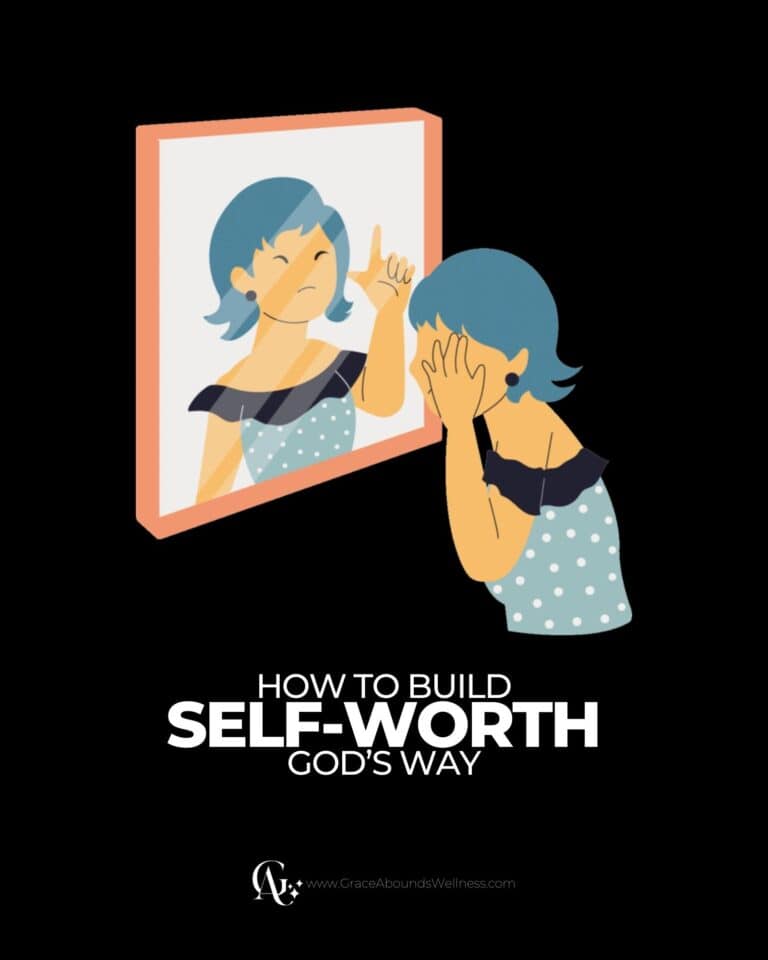

Join the List
Stay up to date & receive the latest posts in your inbox.